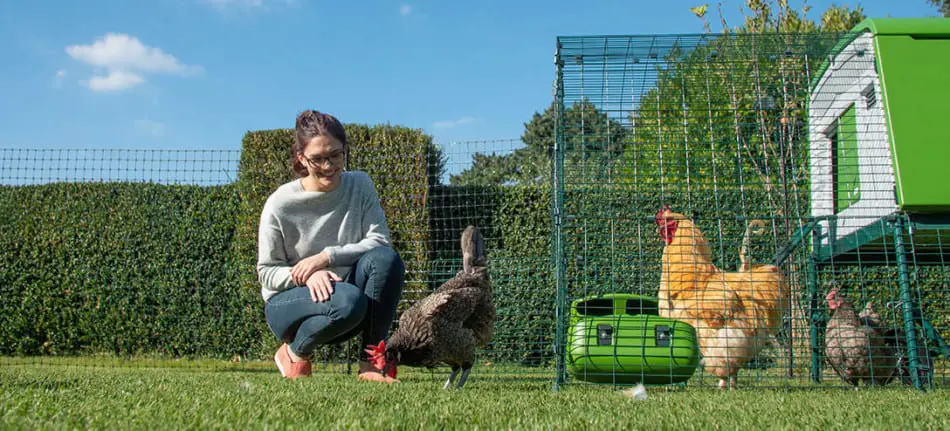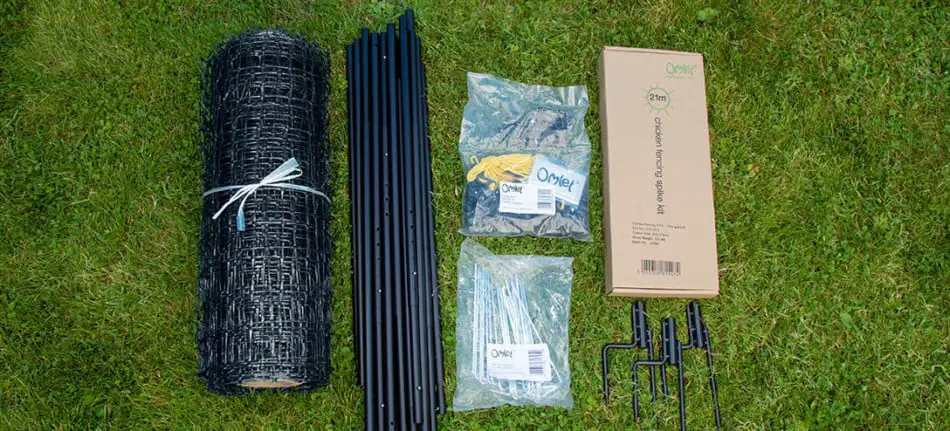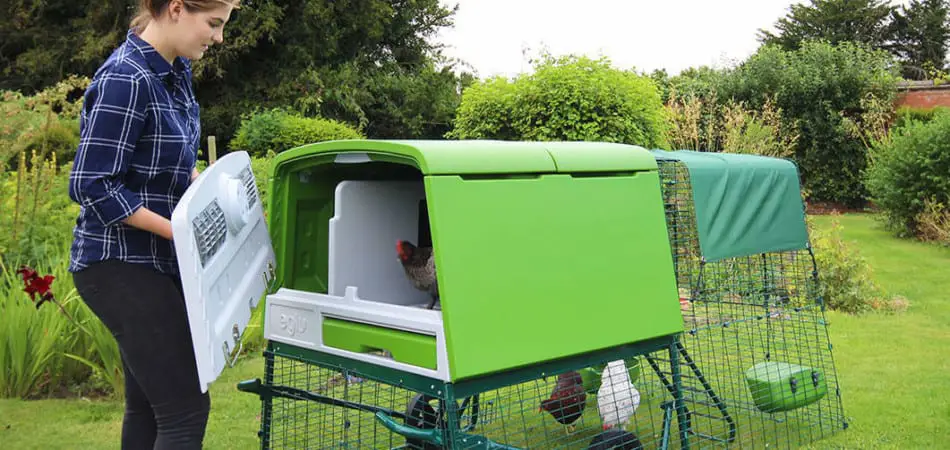If you are a backyard chicken owner, you are probably wondering about how to protect your chickens from predators? Depending on where you live and the number of chickens you have, there are several different things that you can do to protect them.
In this article we’ll look at some simple and effective ways to protect your lovely yummy egg producing hens from those nasty predators like foxes.
And, we’ll offer you some shop-bought solutions like the Omlet.com wire chicken run.
Table of Contents
Ways to Protect Your Chickens from Predators
There are a variety of different ways to protect your chickens from predators. Since backyard chickens are basically defenseless, it’s important that you take the steps necessary to keep them safe from harm.
The first thing that you need to do is to be aware of what types of predators you have in your area. If you live in the country, you will have far more predators than someone who lives in the suburbs.
Chicken predators
Just a few of the potential predators that you may have to deal with include hawks, foxes, coyotes, owls, raccoons, possums, and backyard dogs.
Once you’ve learned which predators are most likely to attack your chickens, you will have a better idea of how you can stop them.

How do chickens protect themselves from predators?
Chickens will try to fly or run away from a predator. They also have sharp claws they will use to try to get away from anything that tries to attack them.
And, if you have a rooster, he will try to protect his girls by using the pointed spurs on the back of his legs.
They will also make a loud alarm noise to alert you and others in the area that there is a problem. This noise should be your first warning that there may be a predator near your chickens.
What animal will protect my chickens?
One of the best ways to protect your chickens from predators is by using a rooster. Roosters are very territorial and will run and attack any potential predators.
If you would prefer not to have a rooster, another option is guinea fowl. They will sound a loud alarm and attack the predators.
Some people also have luck using a dog to protect their chickens. However, this will depend on the breed. Some dogs attack chickens. So, it’s important that you have a dog that’s been trained to protect them rather than attack them.
A few potential breeds include Great Pyrenees, Polish Tatra Sheepdog, and Komondor. Speak to a breeder in your area to see what’s available to you and how well they are trained.
Will lights keep predators away from chickens?
Some predators will avoid areas that are brightly lit. So, you can try installing a motion-activated night light that shines brightly in the chicken coop.

To deter potential predators, it’s important that the light be bright. So, while a solar light is an economic choice for outdoor light, it may not be effective. If you do opt for solar light, be sure that it has a battery backup for days that are raining or overcast.
How do I keep hawks away from my chickens?
One of the easiest ways to keep hawks and other birds away from your chickens is to install overhead netting. Because hawks fly down to attack your chickens, stopping them from above is key.
Chicken wire will be the most secure option. It will let your chickens see out but will stop any flying predators from swooping down to attack.
What about fencing?
When it comes to ways to protect your chickens from predators, installing a fence is an absolute must. Chicken wire is the easiest type of fencing to install around your chicken coop. It will allow your chickens to see out of their pen and effectively keep predators out.
When it comes to fencing around your coop, you need to bury your chicken wire below the ground. Most predators will attempt to dig under the chicken wire to get into the coop.
So if you stop at the ground, it doesn’t take long for a raccoon or a dog to dig underneath.

When installing the chicken wire, bury the bottom at least two feet below the ground. If possible, it’s best to bury it four feet deep. Predators can be very determined.
There are many ways to protect chickens from predators when you have a small flock. If you have a very small flock and are in a temperate area, you may be using a chicken tractor rather than a coop during the day.
This allows you to move your chickens around your yard.

If you are using a chicken tractor, be sure that the bottom layer is a layer of mesh. This allows the waste to fall through to the dirt but prevents predators from digging under it.
If you do use this method, it’s important that you keep an eye on your chicken’s feet for any cuts from the wire.
Provide a safe area
One of the best ways to protect chickens from predators is to eliminate the places predators can hide. You want to cut back any brush, tall grasses, or overgrown areas near your coop.
Predators will hide in these areas and stalk the chickens. It’s best if you can clear an area that is 50 to 75 feet around the perimeter of your chicken coop.
If you keep a clear area around the coop, your predators will feel vulnerable and will be less likely to attack. It won’t stop all predators.
But, unless the animal is very hungry and determined, they will look for easier targets.
It’s also important that your coop and fence are well built and maintained. It takes only a very small hole to allow a predator enough room to either get in or pull a board off.
A weasel can squeeze in through a hole that is as small as 1/2″. Take time monthly to walk the perimeter of your coop and look for loose or rotten boards and holes that predators can use to get in.
Ways to protect your chickens from predators when they free-range
If you allow your chickens to roam free rather than keeping them in a coop or pen, it’s much more difficult to protect them from predators. It’s vital that they have a safe shelter that they can run to when they sense danger.
This can be as simple as a coop that is covered and raised off the ground. It won’t protect them from a determined raccoon. But, it will give them somewhere to run if they sense a hawk or a neighbor’s dog in the area.

Even if you allow your chickens to free-range during the day, they need to have a coop to nest in at night. This protects them from the weather. And, it gives them somewhere to lay their eggs each day.
Eliminate the food source
Some predators aren’t necessarily attracted to your chickens as much as the food that they eat. If you feed your chickens grain-based food, it will attract rats. And, rats will eat not only the foot but also the eggs and the baby chicks.
Skunks and snakes will also be attracted to your coop for food. Keep in mind that a snake can get through even the smallest holes in chicken wire fencing.
And, both snakes and skunks will devour any eggs they find left in the nest. Remember that some chickens will lay throughout the day and not just in the morning. So, it’s important to collect the eggs multiple times a day.
Here is an automatic feeder we use!
To help prevent these predators, lock up food in a metal container with a tightly fitting lid. And, be sure to remove any food scraps left behind that your chickens have not eaten.
Remove the eggs from the nests each morning if your hens are not broody.
And, make sure that any broken eggs are immediately removed and the mess cleaned up. Clean their feeders and nesting areas regularly to avoid waste build-up that may attract predators.
Summary of ways to protect your chickens from predators
- Provide your chickens with a secure coop that you inspect regularly for holes, loose boards, or damage that would allow predators entry.
- Fence your coop with chicken wire. Bury the chicken wire two to four feet deep to prevent digging. And, cover the top of the run to discourage hawks and owls.
- Clear an area of fifty feet around your coop of brush and tall grasses to discourage predators from hiding and stalking your chickens.
- Install a brightly lit motion activated light to discourage nighttime predators. If you choose solar, opt for one with a battery backup.
- Keep all of the chicken feed in a tightly secured metal storage container. This will discourage predators that are attracted to the feed.
- Consider getting a guard dog, a rooster, or a pair of guinea hens to help protect your chickens from predators.
- Be sure that chickens have a safety shelter they can run to if they feel threatened. This will give them some type of shelter if needed.
- Extra care needs to be taken when you have chicks and eggs. Some predators will be attracted to these rather than to your adult chickens.

What are chickens afraid of?
Despite the name, chickens aren’t scared by much, even their predators. If you are trying to scare chickens to keep them away from certain areas, try putting citrus fruits out instead, they won’t like the taste and they will stop coming back.
Will a donkey protect your chickens?
Donkeys are great guard animals. They will put themselves between your chickens and the threat, and will protect your chickens from snakes, raccoons, and coyotes.
Will a hawk keep coming back for chickens?
If a hawk is able to grab a chicken dinner one night, they will keep coming back when they are hungry. The best thing you can do is protect your coop from the top so a hawk doesn’t have the chance to get the first chicken.
How to protect chickens from snakes?
To keep a chicken coop snake-free, you need to keep the grass cut short and remove any bushes or debris that snakes could hide in, catch and remove and rodent nests, collect chicken eggs regularly, and attach a coop apron onto your coop.
How do chickens protect themselves?
A chicken’s clawed foot is great for digging for food, but they also use their feet to scratch their predators to defend themselves.
Conclusion: How to protect your chickens from predators
As you can see it’s not just foxes that you need to watch out for. But you can also take comfort that there are plenty of ways to protect your beloved backyard chickens from predators of all types.
Hopefully, one of the solutions we have provided will be the answer and keep your chickens safe.





